LPM105 - EU as Global Actor: UK's Exit, Trade & Human Rights Roles
VerifiedAdded on 2023/06/12
|11
|3762
|479
Essay
AI Summary
This essay explores the European Union's role as a global actor, analyzing its trade policies, human rights initiatives, and the impact of Brexit. It discusses the EU's actorness, coherence, and the challenges and opportunities presented by the UK's withdrawal. The essay examines the implications of Brexit on trade, security, and economic control, as well as its effects on the EU's international stature. It also delves into the complexities of sovereignty, immigration, and job opportunities in the context of Brexit, providing a comprehensive overview of the EU's position in global politics and the consequences of the UK's departure. The paper also highlights the importance of strategic planning and policy development for the EU to navigate the challenges and maintain its influence in the international arena.
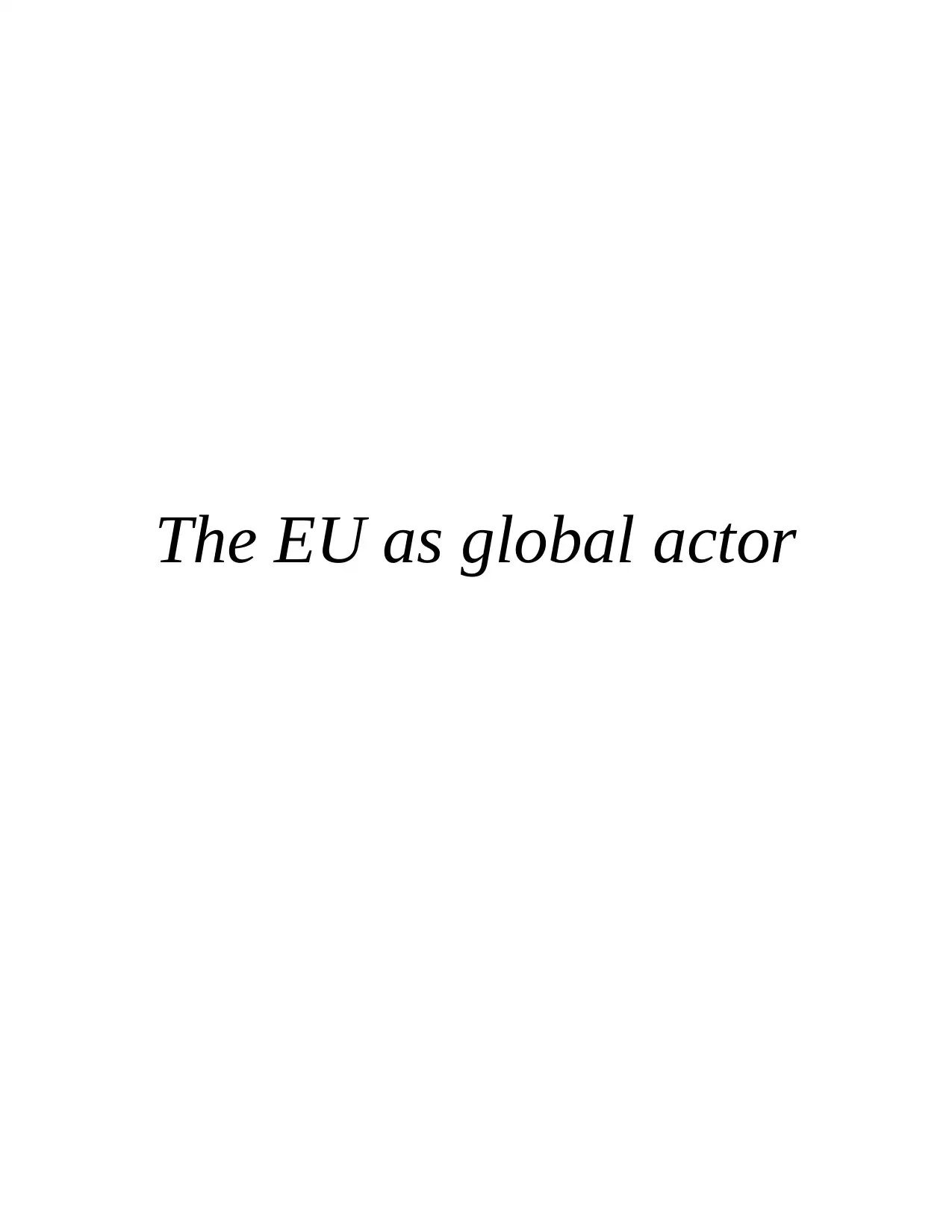
The EU as global actor
Paraphrase This Document
Need a fresh take? Get an instant paraphrase of this document with our AI Paraphraser
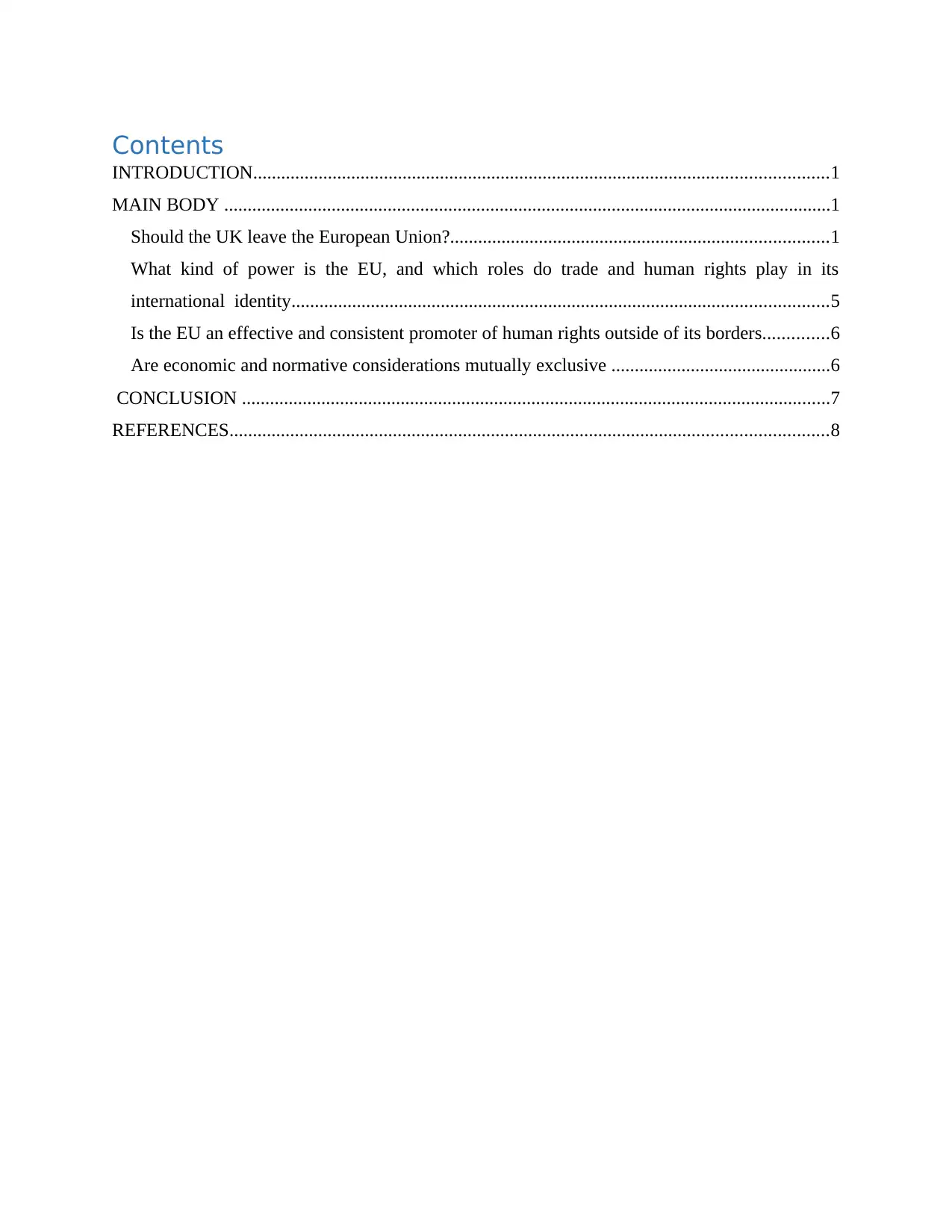
Contents
INTRODUCTION...........................................................................................................................1
MAIN BODY ..................................................................................................................................1
Should the UK leave the European Union?.................................................................................1
What kind of power is the EU, and which roles do trade and human rights play in its
international identity...................................................................................................................5
Is the EU an effective and consistent promoter of human rights outside of its borders..............6
Are economic and normative considerations mutually exclusive ...............................................6
CONCLUSION ..............................................................................................................................7
REFERENCES................................................................................................................................8
INTRODUCTION...........................................................................................................................1
MAIN BODY ..................................................................................................................................1
Should the UK leave the European Union?.................................................................................1
What kind of power is the EU, and which roles do trade and human rights play in its
international identity...................................................................................................................5
Is the EU an effective and consistent promoter of human rights outside of its borders..............6
Are economic and normative considerations mutually exclusive ...............................................6
CONCLUSION ..............................................................................................................................7
REFERENCES................................................................................................................................8

⊘ This is a preview!⊘
Do you want full access?
Subscribe today to unlock all pages.

Trusted by 1+ million students worldwide
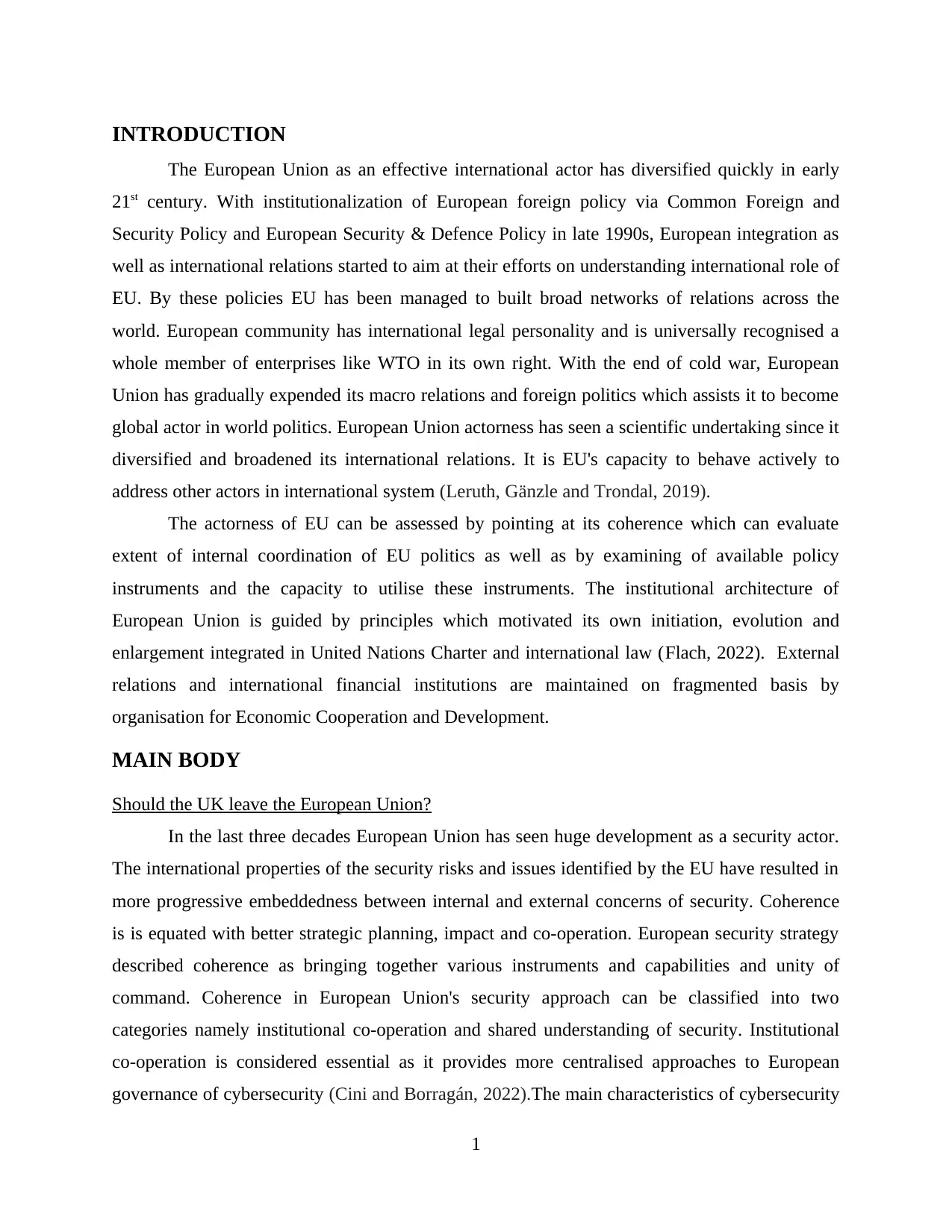
INTRODUCTION
The European Union as an effective international actor has diversified quickly in early
21st century. With institutionalization of European foreign policy via Common Foreign and
Security Policy and European Security & Defence Policy in late 1990s, European integration as
well as international relations started to aim at their efforts on understanding international role of
EU. By these policies EU has been managed to built broad networks of relations across the
world. European community has international legal personality and is universally recognised a
whole member of enterprises like WTO in its own right. With the end of cold war, European
Union has gradually expended its macro relations and foreign politics which assists it to become
global actor in world politics. European Union actorness has seen a scientific undertaking since it
diversified and broadened its international relations. It is EU's capacity to behave actively to
address other actors in international system (Leruth, Gänzle and Trondal, 2019).
The actorness of EU can be assessed by pointing at its coherence which can evaluate
extent of internal coordination of EU politics as well as by examining of available policy
instruments and the capacity to utilise these instruments. The institutional architecture of
European Union is guided by principles which motivated its own initiation, evolution and
enlargement integrated in United Nations Charter and international law (Flach, 2022). External
relations and international financial institutions are maintained on fragmented basis by
organisation for Economic Cooperation and Development.
MAIN BODY
Should the UK leave the European Union?
In the last three decades European Union has seen huge development as a security actor.
The international properties of the security risks and issues identified by the EU have resulted in
more progressive embeddedness between internal and external concerns of security. Coherence
is is equated with better strategic planning, impact and co-operation. European security strategy
described coherence as bringing together various instruments and capabilities and unity of
command. Coherence in European Union's security approach can be classified into two
categories namely institutional co-operation and shared understanding of security. Institutional
co-operation is considered essential as it provides more centralised approaches to European
governance of cybersecurity (Cini and Borragán, 2022).The main characteristics of cybersecurity
1
The European Union as an effective international actor has diversified quickly in early
21st century. With institutionalization of European foreign policy via Common Foreign and
Security Policy and European Security & Defence Policy in late 1990s, European integration as
well as international relations started to aim at their efforts on understanding international role of
EU. By these policies EU has been managed to built broad networks of relations across the
world. European community has international legal personality and is universally recognised a
whole member of enterprises like WTO in its own right. With the end of cold war, European
Union has gradually expended its macro relations and foreign politics which assists it to become
global actor in world politics. European Union actorness has seen a scientific undertaking since it
diversified and broadened its international relations. It is EU's capacity to behave actively to
address other actors in international system (Leruth, Gänzle and Trondal, 2019).
The actorness of EU can be assessed by pointing at its coherence which can evaluate
extent of internal coordination of EU politics as well as by examining of available policy
instruments and the capacity to utilise these instruments. The institutional architecture of
European Union is guided by principles which motivated its own initiation, evolution and
enlargement integrated in United Nations Charter and international law (Flach, 2022). External
relations and international financial institutions are maintained on fragmented basis by
organisation for Economic Cooperation and Development.
MAIN BODY
Should the UK leave the European Union?
In the last three decades European Union has seen huge development as a security actor.
The international properties of the security risks and issues identified by the EU have resulted in
more progressive embeddedness between internal and external concerns of security. Coherence
is is equated with better strategic planning, impact and co-operation. European security strategy
described coherence as bringing together various instruments and capabilities and unity of
command. Coherence in European Union's security approach can be classified into two
categories namely institutional co-operation and shared understanding of security. Institutional
co-operation is considered essential as it provides more centralised approaches to European
governance of cybersecurity (Cini and Borragán, 2022).The main characteristics of cybersecurity
1
Paraphrase This Document
Need a fresh take? Get an instant paraphrase of this document with our AI Paraphraser
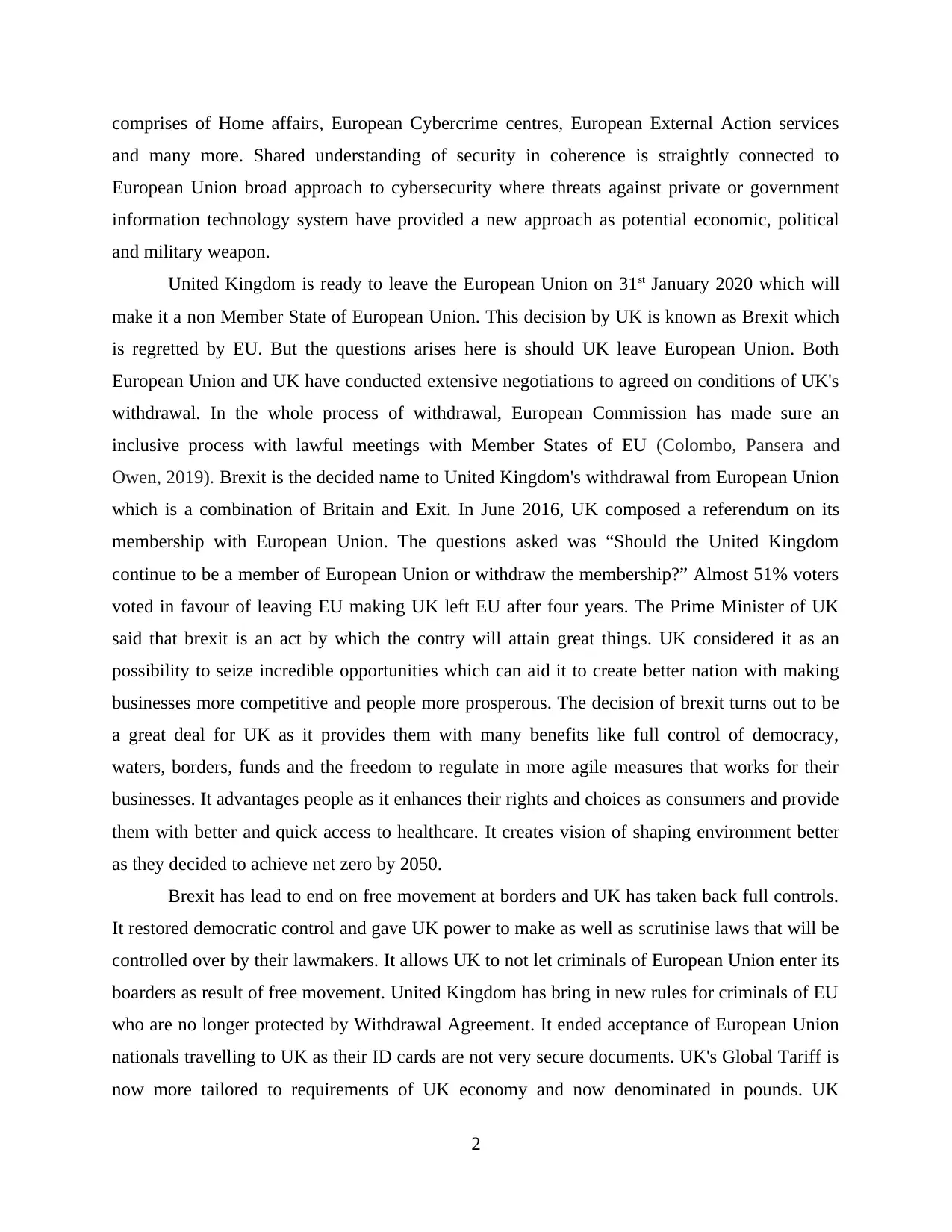
comprises of Home affairs, European Cybercrime centres, European External Action services
and many more. Shared understanding of security in coherence is straightly connected to
European Union broad approach to cybersecurity where threats against private or government
information technology system have provided a new approach as potential economic, political
and military weapon.
United Kingdom is ready to leave the European Union on 31st January 2020 which will
make it a non Member State of European Union. This decision by UK is known as Brexit which
is regretted by EU. But the questions arises here is should UK leave European Union. Both
European Union and UK have conducted extensive negotiations to agreed on conditions of UK's
withdrawal. In the whole process of withdrawal, European Commission has made sure an
inclusive process with lawful meetings with Member States of EU (Colombo, Pansera and
Owen, 2019). Brexit is the decided name to United Kingdom's withdrawal from European Union
which is a combination of Britain and Exit. In June 2016, UK composed a referendum on its
membership with European Union. The questions asked was “Should the United Kingdom
continue to be a member of European Union or withdraw the membership?” Almost 51% voters
voted in favour of leaving EU making UK left EU after four years. The Prime Minister of UK
said that brexit is an act by which the contry will attain great things. UK considered it as an
possibility to seize incredible opportunities which can aid it to create better nation with making
businesses more competitive and people more prosperous. The decision of brexit turns out to be
a great deal for UK as it provides them with many benefits like full control of democracy,
waters, borders, funds and the freedom to regulate in more agile measures that works for their
businesses. It advantages people as it enhances their rights and choices as consumers and provide
them with better and quick access to healthcare. It creates vision of shaping environment better
as they decided to achieve net zero by 2050.
Brexit has lead to end on free movement at borders and UK has taken back full controls.
It restored democratic control and gave UK power to make as well as scrutinise laws that will be
controlled over by their lawmakers. It allows UK to not let criminals of European Union enter its
boarders as result of free movement. United Kingdom has bring in new rules for criminals of EU
who are no longer protected by Withdrawal Agreement. It ended acceptance of European Union
nationals travelling to UK as their ID cards are not very secure documents. UK's Global Tariff is
now more tailored to requirements of UK economy and now denominated in pounds. UK
2
and many more. Shared understanding of security in coherence is straightly connected to
European Union broad approach to cybersecurity where threats against private or government
information technology system have provided a new approach as potential economic, political
and military weapon.
United Kingdom is ready to leave the European Union on 31st January 2020 which will
make it a non Member State of European Union. This decision by UK is known as Brexit which
is regretted by EU. But the questions arises here is should UK leave European Union. Both
European Union and UK have conducted extensive negotiations to agreed on conditions of UK's
withdrawal. In the whole process of withdrawal, European Commission has made sure an
inclusive process with lawful meetings with Member States of EU (Colombo, Pansera and
Owen, 2019). Brexit is the decided name to United Kingdom's withdrawal from European Union
which is a combination of Britain and Exit. In June 2016, UK composed a referendum on its
membership with European Union. The questions asked was “Should the United Kingdom
continue to be a member of European Union or withdraw the membership?” Almost 51% voters
voted in favour of leaving EU making UK left EU after four years. The Prime Minister of UK
said that brexit is an act by which the contry will attain great things. UK considered it as an
possibility to seize incredible opportunities which can aid it to create better nation with making
businesses more competitive and people more prosperous. The decision of brexit turns out to be
a great deal for UK as it provides them with many benefits like full control of democracy,
waters, borders, funds and the freedom to regulate in more agile measures that works for their
businesses. It advantages people as it enhances their rights and choices as consumers and provide
them with better and quick access to healthcare. It creates vision of shaping environment better
as they decided to achieve net zero by 2050.
Brexit has lead to end on free movement at borders and UK has taken back full controls.
It restored democratic control and gave UK power to make as well as scrutinise laws that will be
controlled over by their lawmakers. It allows UK to not let criminals of European Union enter its
boarders as result of free movement. United Kingdom has bring in new rules for criminals of EU
who are no longer protected by Withdrawal Agreement. It ended acceptance of European Union
nationals travelling to UK as their ID cards are not very secure documents. UK's Global Tariff is
now more tailored to requirements of UK economy and now denominated in pounds. UK
2
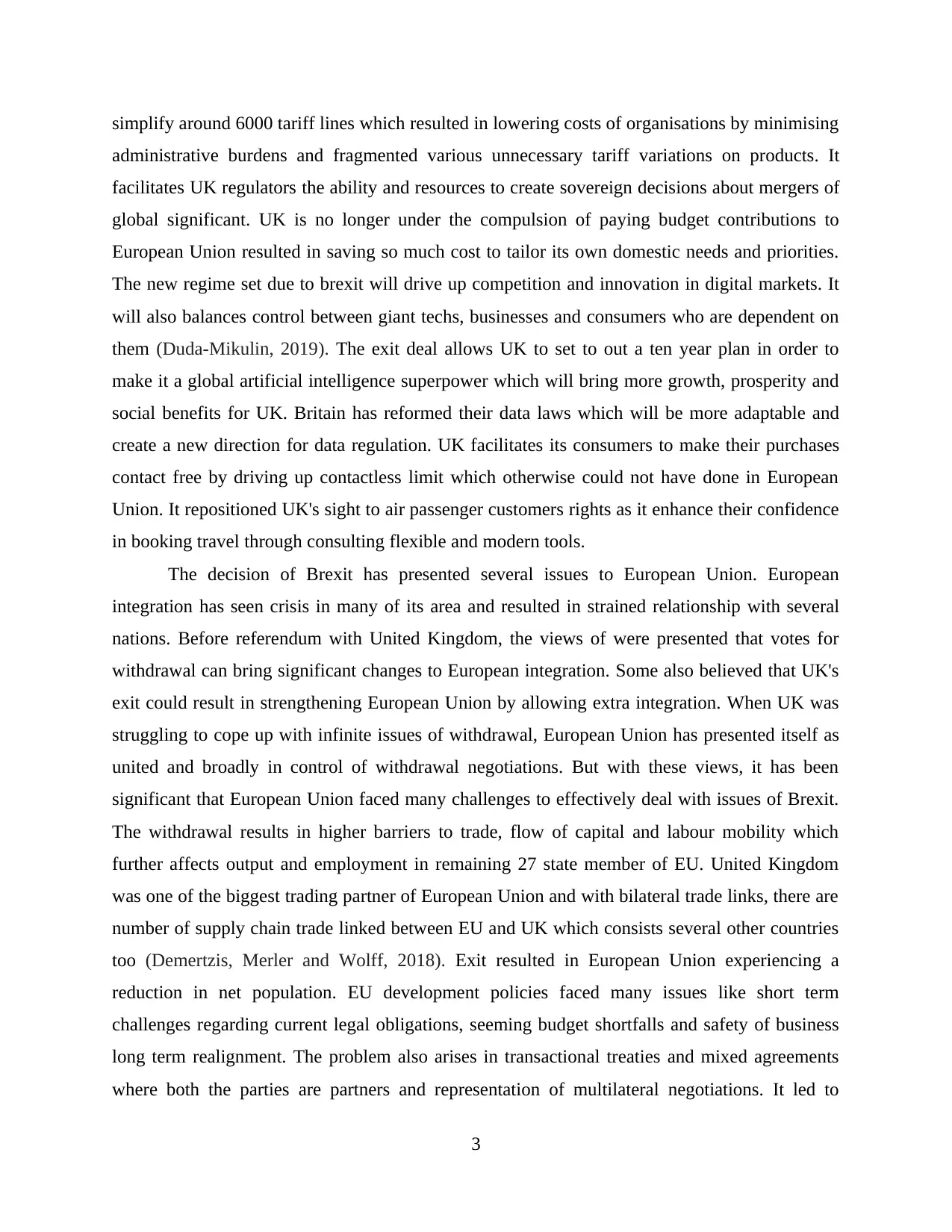
simplify around 6000 tariff lines which resulted in lowering costs of organisations by minimising
administrative burdens and fragmented various unnecessary tariff variations on products. It
facilitates UK regulators the ability and resources to create sovereign decisions about mergers of
global significant. UK is no longer under the compulsion of paying budget contributions to
European Union resulted in saving so much cost to tailor its own domestic needs and priorities.
The new regime set due to brexit will drive up competition and innovation in digital markets. It
will also balances control between giant techs, businesses and consumers who are dependent on
them (Duda-Mikulin, 2019). The exit deal allows UK to set to out a ten year plan in order to
make it a global artificial intelligence superpower which will bring more growth, prosperity and
social benefits for UK. Britain has reformed their data laws which will be more adaptable and
create a new direction for data regulation. UK facilitates its consumers to make their purchases
contact free by driving up contactless limit which otherwise could not have done in European
Union. It repositioned UK's sight to air passenger customers rights as it enhance their confidence
in booking travel through consulting flexible and modern tools.
The decision of Brexit has presented several issues to European Union. European
integration has seen crisis in many of its area and resulted in strained relationship with several
nations. Before referendum with United Kingdom, the views of were presented that votes for
withdrawal can bring significant changes to European integration. Some also believed that UK's
exit could result in strengthening European Union by allowing extra integration. When UK was
struggling to cope up with infinite issues of withdrawal, European Union has presented itself as
united and broadly in control of withdrawal negotiations. But with these views, it has been
significant that European Union faced many challenges to effectively deal with issues of Brexit.
The withdrawal results in higher barriers to trade, flow of capital and labour mobility which
further affects output and employment in remaining 27 state member of EU. United Kingdom
was one of the biggest trading partner of European Union and with bilateral trade links, there are
number of supply chain trade linked between EU and UK which consists several other countries
too (Demertzis, Merler and Wolff, 2018). Exit resulted in European Union experiencing a
reduction in net population. EU development policies faced many issues like short term
challenges regarding current legal obligations, seeming budget shortfalls and safety of business
long term realignment. The problem also arises in transactional treaties and mixed agreements
where both the parties are partners and representation of multilateral negotiations. It led to
3
administrative burdens and fragmented various unnecessary tariff variations on products. It
facilitates UK regulators the ability and resources to create sovereign decisions about mergers of
global significant. UK is no longer under the compulsion of paying budget contributions to
European Union resulted in saving so much cost to tailor its own domestic needs and priorities.
The new regime set due to brexit will drive up competition and innovation in digital markets. It
will also balances control between giant techs, businesses and consumers who are dependent on
them (Duda-Mikulin, 2019). The exit deal allows UK to set to out a ten year plan in order to
make it a global artificial intelligence superpower which will bring more growth, prosperity and
social benefits for UK. Britain has reformed their data laws which will be more adaptable and
create a new direction for data regulation. UK facilitates its consumers to make their purchases
contact free by driving up contactless limit which otherwise could not have done in European
Union. It repositioned UK's sight to air passenger customers rights as it enhance their confidence
in booking travel through consulting flexible and modern tools.
The decision of Brexit has presented several issues to European Union. European
integration has seen crisis in many of its area and resulted in strained relationship with several
nations. Before referendum with United Kingdom, the views of were presented that votes for
withdrawal can bring significant changes to European integration. Some also believed that UK's
exit could result in strengthening European Union by allowing extra integration. When UK was
struggling to cope up with infinite issues of withdrawal, European Union has presented itself as
united and broadly in control of withdrawal negotiations. But with these views, it has been
significant that European Union faced many challenges to effectively deal with issues of Brexit.
The withdrawal results in higher barriers to trade, flow of capital and labour mobility which
further affects output and employment in remaining 27 state member of EU. United Kingdom
was one of the biggest trading partner of European Union and with bilateral trade links, there are
number of supply chain trade linked between EU and UK which consists several other countries
too (Demertzis, Merler and Wolff, 2018). Exit resulted in European Union experiencing a
reduction in net population. EU development policies faced many issues like short term
challenges regarding current legal obligations, seeming budget shortfalls and safety of business
long term realignment. The problem also arises in transactional treaties and mixed agreements
where both the parties are partners and representation of multilateral negotiations. It led to
3
⊘ This is a preview!⊘
Do you want full access?
Subscribe today to unlock all pages.

Trusted by 1+ million students worldwide
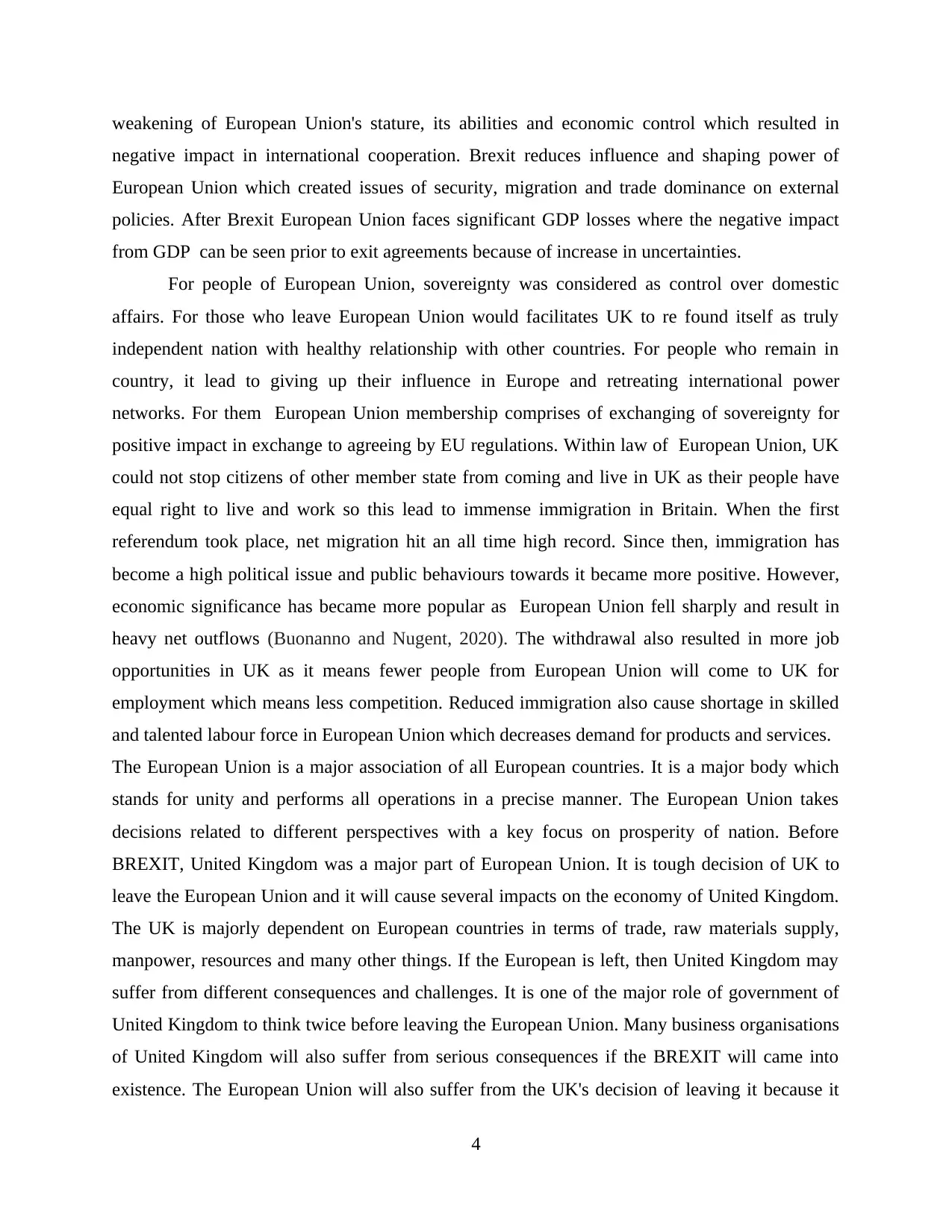
weakening of European Union's stature, its abilities and economic control which resulted in
negative impact in international cooperation. Brexit reduces influence and shaping power of
European Union which created issues of security, migration and trade dominance on external
policies. After Brexit European Union faces significant GDP losses where the negative impact
from GDP can be seen prior to exit agreements because of increase in uncertainties.
For people of European Union, sovereignty was considered as control over domestic
affairs. For those who leave European Union would facilitates UK to re found itself as truly
independent nation with healthy relationship with other countries. For people who remain in
country, it lead to giving up their influence in Europe and retreating international power
networks. For them European Union membership comprises of exchanging of sovereignty for
positive impact in exchange to agreeing by EU regulations. Within law of European Union, UK
could not stop citizens of other member state from coming and live in UK as their people have
equal right to live and work so this lead to immense immigration in Britain. When the first
referendum took place, net migration hit an all time high record. Since then, immigration has
become a high political issue and public behaviours towards it became more positive. However,
economic significance has became more popular as European Union fell sharply and result in
heavy net outflows (Buonanno and Nugent, 2020). The withdrawal also resulted in more job
opportunities in UK as it means fewer people from European Union will come to UK for
employment which means less competition. Reduced immigration also cause shortage in skilled
and talented labour force in European Union which decreases demand for products and services.
The European Union is a major association of all European countries. It is a major body which
stands for unity and performs all operations in a precise manner. The European Union takes
decisions related to different perspectives with a key focus on prosperity of nation. Before
BREXIT, United Kingdom was a major part of European Union. It is tough decision of UK to
leave the European Union and it will cause several impacts on the economy of United Kingdom.
The UK is majorly dependent on European countries in terms of trade, raw materials supply,
manpower, resources and many other things. If the European is left, then United Kingdom may
suffer from different consequences and challenges. It is one of the major role of government of
United Kingdom to think twice before leaving the European Union. Many business organisations
of United Kingdom will also suffer from serious consequences if the BREXIT will came into
existence. The European Union will also suffer from the UK's decision of leaving it because it
4
negative impact in international cooperation. Brexit reduces influence and shaping power of
European Union which created issues of security, migration and trade dominance on external
policies. After Brexit European Union faces significant GDP losses where the negative impact
from GDP can be seen prior to exit agreements because of increase in uncertainties.
For people of European Union, sovereignty was considered as control over domestic
affairs. For those who leave European Union would facilitates UK to re found itself as truly
independent nation with healthy relationship with other countries. For people who remain in
country, it lead to giving up their influence in Europe and retreating international power
networks. For them European Union membership comprises of exchanging of sovereignty for
positive impact in exchange to agreeing by EU regulations. Within law of European Union, UK
could not stop citizens of other member state from coming and live in UK as their people have
equal right to live and work so this lead to immense immigration in Britain. When the first
referendum took place, net migration hit an all time high record. Since then, immigration has
become a high political issue and public behaviours towards it became more positive. However,
economic significance has became more popular as European Union fell sharply and result in
heavy net outflows (Buonanno and Nugent, 2020). The withdrawal also resulted in more job
opportunities in UK as it means fewer people from European Union will come to UK for
employment which means less competition. Reduced immigration also cause shortage in skilled
and talented labour force in European Union which decreases demand for products and services.
The European Union is a major association of all European countries. It is a major body which
stands for unity and performs all operations in a precise manner. The European Union takes
decisions related to different perspectives with a key focus on prosperity of nation. Before
BREXIT, United Kingdom was a major part of European Union. It is tough decision of UK to
leave the European Union and it will cause several impacts on the economy of United Kingdom.
The UK is majorly dependent on European countries in terms of trade, raw materials supply,
manpower, resources and many other things. If the European is left, then United Kingdom may
suffer from different consequences and challenges. It is one of the major role of government of
United Kingdom to think twice before leaving the European Union. Many business organisations
of United Kingdom will also suffer from serious consequences if the BREXIT will came into
existence. The European Union will also suffer from the UK's decision of leaving it because it
4
Paraphrase This Document
Need a fresh take? Get an instant paraphrase of this document with our AI Paraphraser
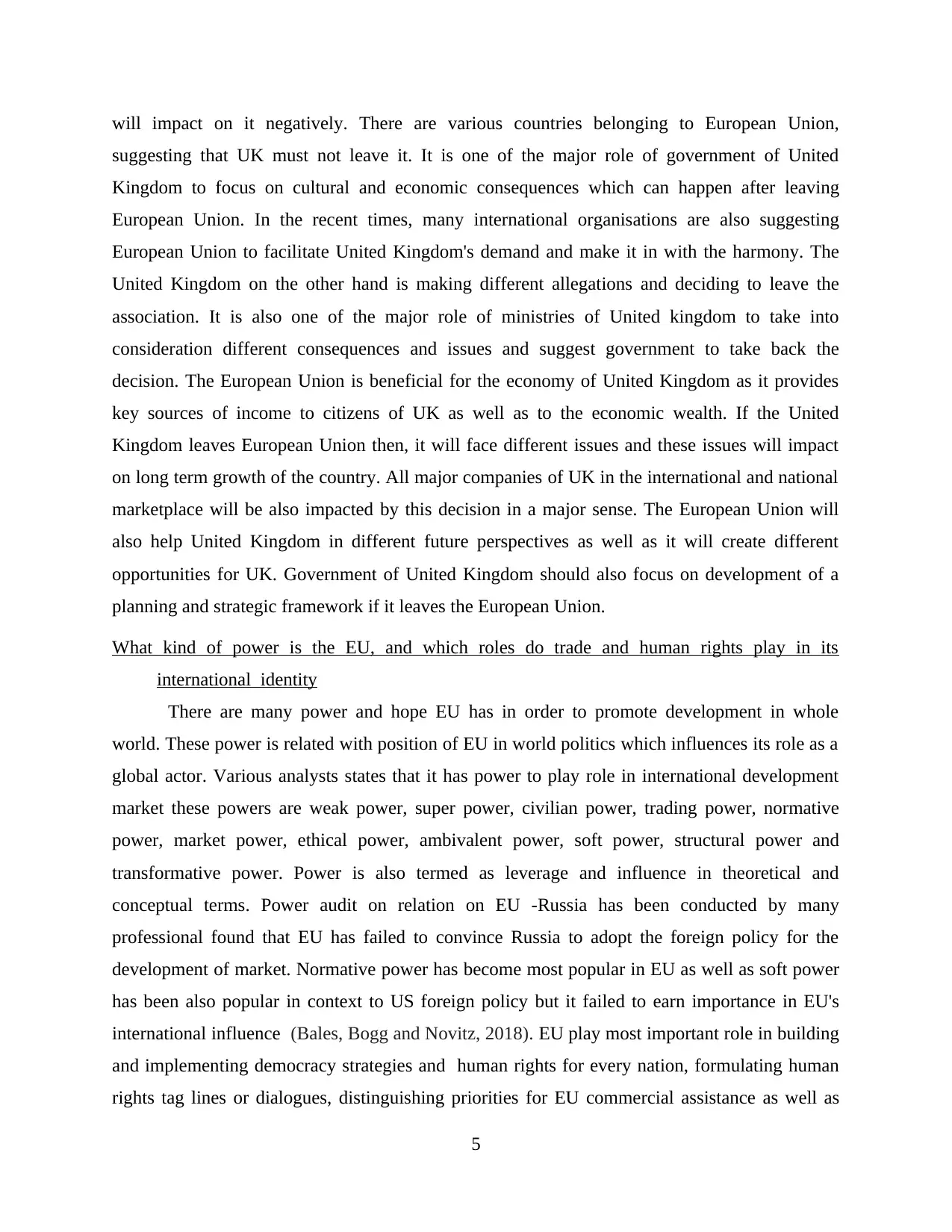
will impact on it negatively. There are various countries belonging to European Union,
suggesting that UK must not leave it. It is one of the major role of government of United
Kingdom to focus on cultural and economic consequences which can happen after leaving
European Union. In the recent times, many international organisations are also suggesting
European Union to facilitate United Kingdom's demand and make it in with the harmony. The
United Kingdom on the other hand is making different allegations and deciding to leave the
association. It is also one of the major role of ministries of United kingdom to take into
consideration different consequences and issues and suggest government to take back the
decision. The European Union is beneficial for the economy of United Kingdom as it provides
key sources of income to citizens of UK as well as to the economic wealth. If the United
Kingdom leaves European Union then, it will face different issues and these issues will impact
on long term growth of the country. All major companies of UK in the international and national
marketplace will be also impacted by this decision in a major sense. The European Union will
also help United Kingdom in different future perspectives as well as it will create different
opportunities for UK. Government of United Kingdom should also focus on development of a
planning and strategic framework if it leaves the European Union.
What kind of power is the EU, and which roles do trade and human rights play in its
international identity
There are many power and hope EU has in order to promote development in whole
world. These power is related with position of EU in world politics which influences its role as a
global actor. Various analysts states that it has power to play role in international development
market these powers are weak power, super power, civilian power, trading power, normative
power, market power, ethical power, ambivalent power, soft power, structural power and
transformative power. Power is also termed as leverage and influence in theoretical and
conceptual terms. Power audit on relation on EU -Russia has been conducted by many
professional found that EU has failed to convince Russia to adopt the foreign policy for the
development of market. Normative power has become most popular in EU as well as soft power
has been also popular in context to US foreign policy but it failed to earn importance in EU's
international influence (Bales, Bogg and Novitz, 2018). EU play most important role in building
and implementing democracy strategies and human rights for every nation, formulating human
rights tag lines or dialogues, distinguishing priorities for EU commercial assistance as well as
5
suggesting that UK must not leave it. It is one of the major role of government of United
Kingdom to focus on cultural and economic consequences which can happen after leaving
European Union. In the recent times, many international organisations are also suggesting
European Union to facilitate United Kingdom's demand and make it in with the harmony. The
United Kingdom on the other hand is making different allegations and deciding to leave the
association. It is also one of the major role of ministries of United kingdom to take into
consideration different consequences and issues and suggest government to take back the
decision. The European Union is beneficial for the economy of United Kingdom as it provides
key sources of income to citizens of UK as well as to the economic wealth. If the United
Kingdom leaves European Union then, it will face different issues and these issues will impact
on long term growth of the country. All major companies of UK in the international and national
marketplace will be also impacted by this decision in a major sense. The European Union will
also help United Kingdom in different future perspectives as well as it will create different
opportunities for UK. Government of United Kingdom should also focus on development of a
planning and strategic framework if it leaves the European Union.
What kind of power is the EU, and which roles do trade and human rights play in its
international identity
There are many power and hope EU has in order to promote development in whole
world. These power is related with position of EU in world politics which influences its role as a
global actor. Various analysts states that it has power to play role in international development
market these powers are weak power, super power, civilian power, trading power, normative
power, market power, ethical power, ambivalent power, soft power, structural power and
transformative power. Power is also termed as leverage and influence in theoretical and
conceptual terms. Power audit on relation on EU -Russia has been conducted by many
professional found that EU has failed to convince Russia to adopt the foreign policy for the
development of market. Normative power has become most popular in EU as well as soft power
has been also popular in context to US foreign policy but it failed to earn importance in EU's
international influence (Bales, Bogg and Novitz, 2018). EU play most important role in building
and implementing democracy strategies and human rights for every nation, formulating human
rights tag lines or dialogues, distinguishing priorities for EU commercial assistance as well as
5
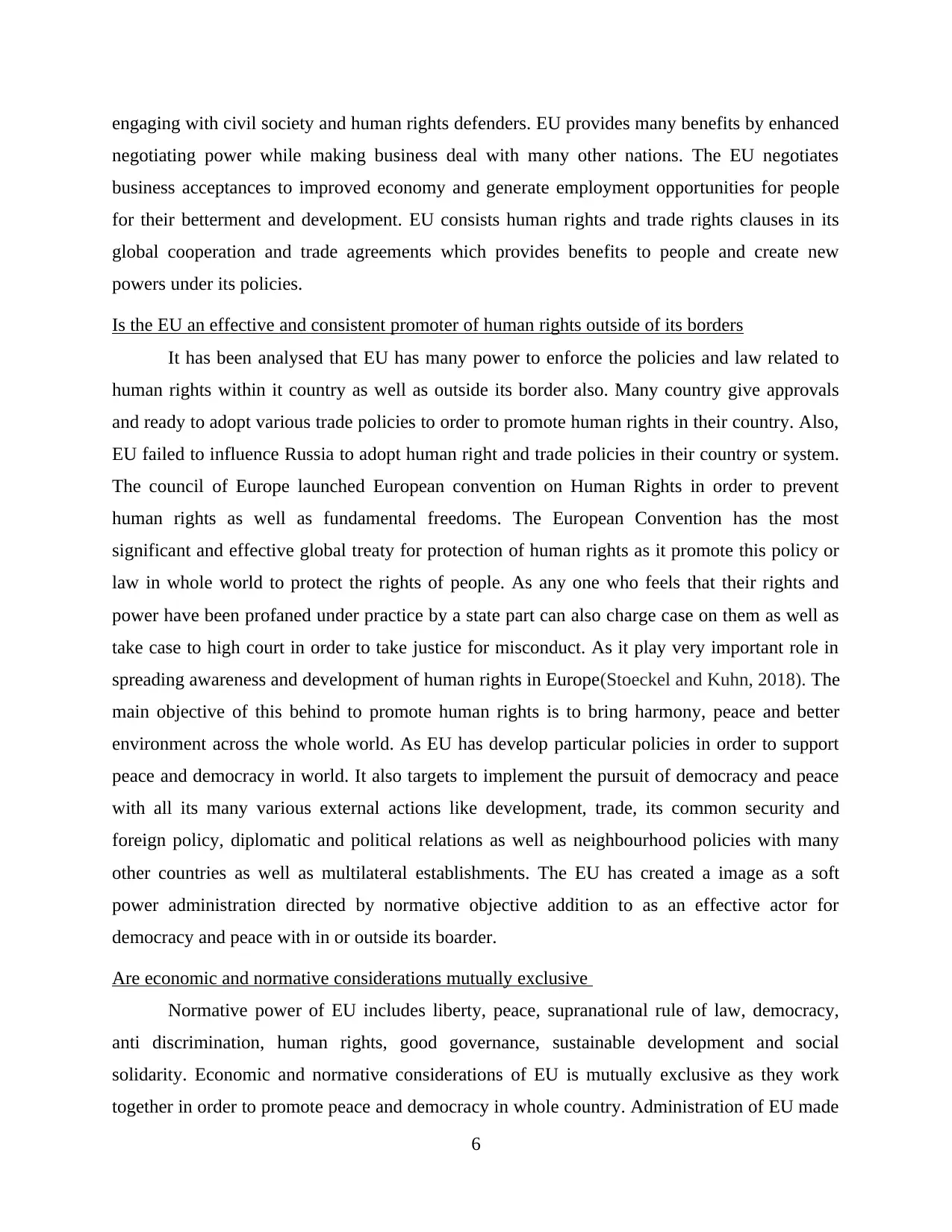
engaging with civil society and human rights defenders. EU provides many benefits by enhanced
negotiating power while making business deal with many other nations. The EU negotiates
business acceptances to improved economy and generate employment opportunities for people
for their betterment and development. EU consists human rights and trade rights clauses in its
global cooperation and trade agreements which provides benefits to people and create new
powers under its policies.
Is the EU an effective and consistent promoter of human rights outside of its borders
It has been analysed that EU has many power to enforce the policies and law related to
human rights within it country as well as outside its border also. Many country give approvals
and ready to adopt various trade policies to order to promote human rights in their country. Also,
EU failed to influence Russia to adopt human right and trade policies in their country or system.
The council of Europe launched European convention on Human Rights in order to prevent
human rights as well as fundamental freedoms. The European Convention has the most
significant and effective global treaty for protection of human rights as it promote this policy or
law in whole world to protect the rights of people. As any one who feels that their rights and
power have been profaned under practice by a state part can also charge case on them as well as
take case to high court in order to take justice for misconduct. As it play very important role in
spreading awareness and development of human rights in Europe(Stoeckel and Kuhn, 2018). The
main objective of this behind to promote human rights is to bring harmony, peace and better
environment across the whole world. As EU has develop particular policies in order to support
peace and democracy in world. It also targets to implement the pursuit of democracy and peace
with all its many various external actions like development, trade, its common security and
foreign policy, diplomatic and political relations as well as neighbourhood policies with many
other countries as well as multilateral establishments. The EU has created a image as a soft
power administration directed by normative objective addition to as an effective actor for
democracy and peace with in or outside its boarder.
Are economic and normative considerations mutually exclusive
Normative power of EU includes liberty, peace, supranational rule of law, democracy,
anti discrimination, human rights, good governance, sustainable development and social
solidarity. Economic and normative considerations of EU is mutually exclusive as they work
together in order to promote peace and democracy in whole country. Administration of EU made
6
negotiating power while making business deal with many other nations. The EU negotiates
business acceptances to improved economy and generate employment opportunities for people
for their betterment and development. EU consists human rights and trade rights clauses in its
global cooperation and trade agreements which provides benefits to people and create new
powers under its policies.
Is the EU an effective and consistent promoter of human rights outside of its borders
It has been analysed that EU has many power to enforce the policies and law related to
human rights within it country as well as outside its border also. Many country give approvals
and ready to adopt various trade policies to order to promote human rights in their country. Also,
EU failed to influence Russia to adopt human right and trade policies in their country or system.
The council of Europe launched European convention on Human Rights in order to prevent
human rights as well as fundamental freedoms. The European Convention has the most
significant and effective global treaty for protection of human rights as it promote this policy or
law in whole world to protect the rights of people. As any one who feels that their rights and
power have been profaned under practice by a state part can also charge case on them as well as
take case to high court in order to take justice for misconduct. As it play very important role in
spreading awareness and development of human rights in Europe(Stoeckel and Kuhn, 2018). The
main objective of this behind to promote human rights is to bring harmony, peace and better
environment across the whole world. As EU has develop particular policies in order to support
peace and democracy in world. It also targets to implement the pursuit of democracy and peace
with all its many various external actions like development, trade, its common security and
foreign policy, diplomatic and political relations as well as neighbourhood policies with many
other countries as well as multilateral establishments. The EU has created a image as a soft
power administration directed by normative objective addition to as an effective actor for
democracy and peace with in or outside its boarder.
Are economic and normative considerations mutually exclusive
Normative power of EU includes liberty, peace, supranational rule of law, democracy,
anti discrimination, human rights, good governance, sustainable development and social
solidarity. Economic and normative considerations of EU is mutually exclusive as they work
together in order to promote peace and democracy in whole country. Administration of EU made
6
⊘ This is a preview!⊘
Do you want full access?
Subscribe today to unlock all pages.

Trusted by 1+ million students worldwide
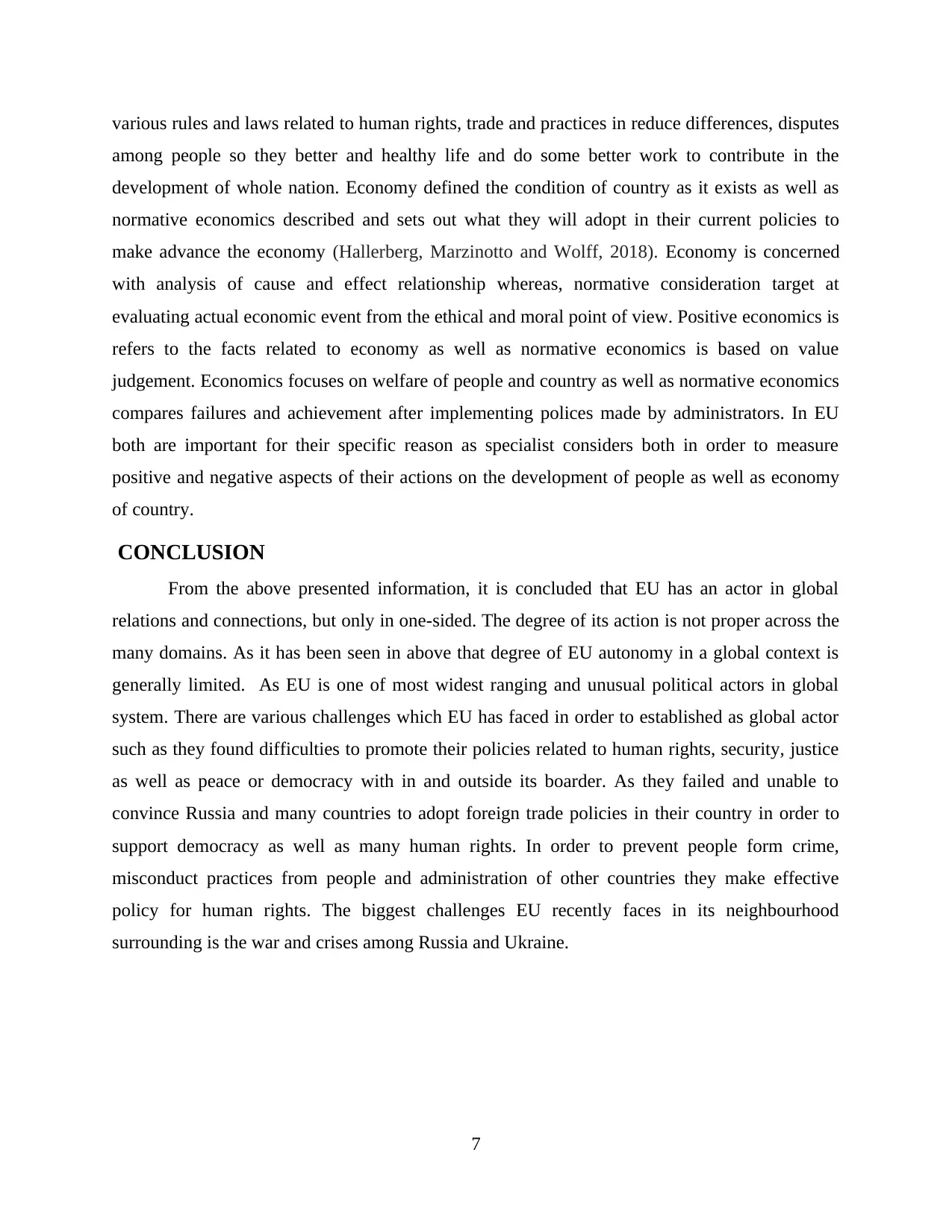
various rules and laws related to human rights, trade and practices in reduce differences, disputes
among people so they better and healthy life and do some better work to contribute in the
development of whole nation. Economy defined the condition of country as it exists as well as
normative economics described and sets out what they will adopt in their current policies to
make advance the economy (Hallerberg, Marzinotto and Wolff, 2018). Economy is concerned
with analysis of cause and effect relationship whereas, normative consideration target at
evaluating actual economic event from the ethical and moral point of view. Positive economics is
refers to the facts related to economy as well as normative economics is based on value
judgement. Economics focuses on welfare of people and country as well as normative economics
compares failures and achievement after implementing polices made by administrators. In EU
both are important for their specific reason as specialist considers both in order to measure
positive and negative aspects of their actions on the development of people as well as economy
of country.
CONCLUSION
From the above presented information, it is concluded that EU has an actor in global
relations and connections, but only in one-sided. The degree of its action is not proper across the
many domains. As it has been seen in above that degree of EU autonomy in a global context is
generally limited. As EU is one of most widest ranging and unusual political actors in global
system. There are various challenges which EU has faced in order to established as global actor
such as they found difficulties to promote their policies related to human rights, security, justice
as well as peace or democracy with in and outside its boarder. As they failed and unable to
convince Russia and many countries to adopt foreign trade policies in their country in order to
support democracy as well as many human rights. In order to prevent people form crime,
misconduct practices from people and administration of other countries they make effective
policy for human rights. The biggest challenges EU recently faces in its neighbourhood
surrounding is the war and crises among Russia and Ukraine.
7
among people so they better and healthy life and do some better work to contribute in the
development of whole nation. Economy defined the condition of country as it exists as well as
normative economics described and sets out what they will adopt in their current policies to
make advance the economy (Hallerberg, Marzinotto and Wolff, 2018). Economy is concerned
with analysis of cause and effect relationship whereas, normative consideration target at
evaluating actual economic event from the ethical and moral point of view. Positive economics is
refers to the facts related to economy as well as normative economics is based on value
judgement. Economics focuses on welfare of people and country as well as normative economics
compares failures and achievement after implementing polices made by administrators. In EU
both are important for their specific reason as specialist considers both in order to measure
positive and negative aspects of their actions on the development of people as well as economy
of country.
CONCLUSION
From the above presented information, it is concluded that EU has an actor in global
relations and connections, but only in one-sided. The degree of its action is not proper across the
many domains. As it has been seen in above that degree of EU autonomy in a global context is
generally limited. As EU is one of most widest ranging and unusual political actors in global
system. There are various challenges which EU has faced in order to established as global actor
such as they found difficulties to promote their policies related to human rights, security, justice
as well as peace or democracy with in and outside its boarder. As they failed and unable to
convince Russia and many countries to adopt foreign trade policies in their country in order to
support democracy as well as many human rights. In order to prevent people form crime,
misconduct practices from people and administration of other countries they make effective
policy for human rights. The biggest challenges EU recently faces in its neighbourhood
surrounding is the war and crises among Russia and Ukraine.
7
Paraphrase This Document
Need a fresh take? Get an instant paraphrase of this document with our AI Paraphraser
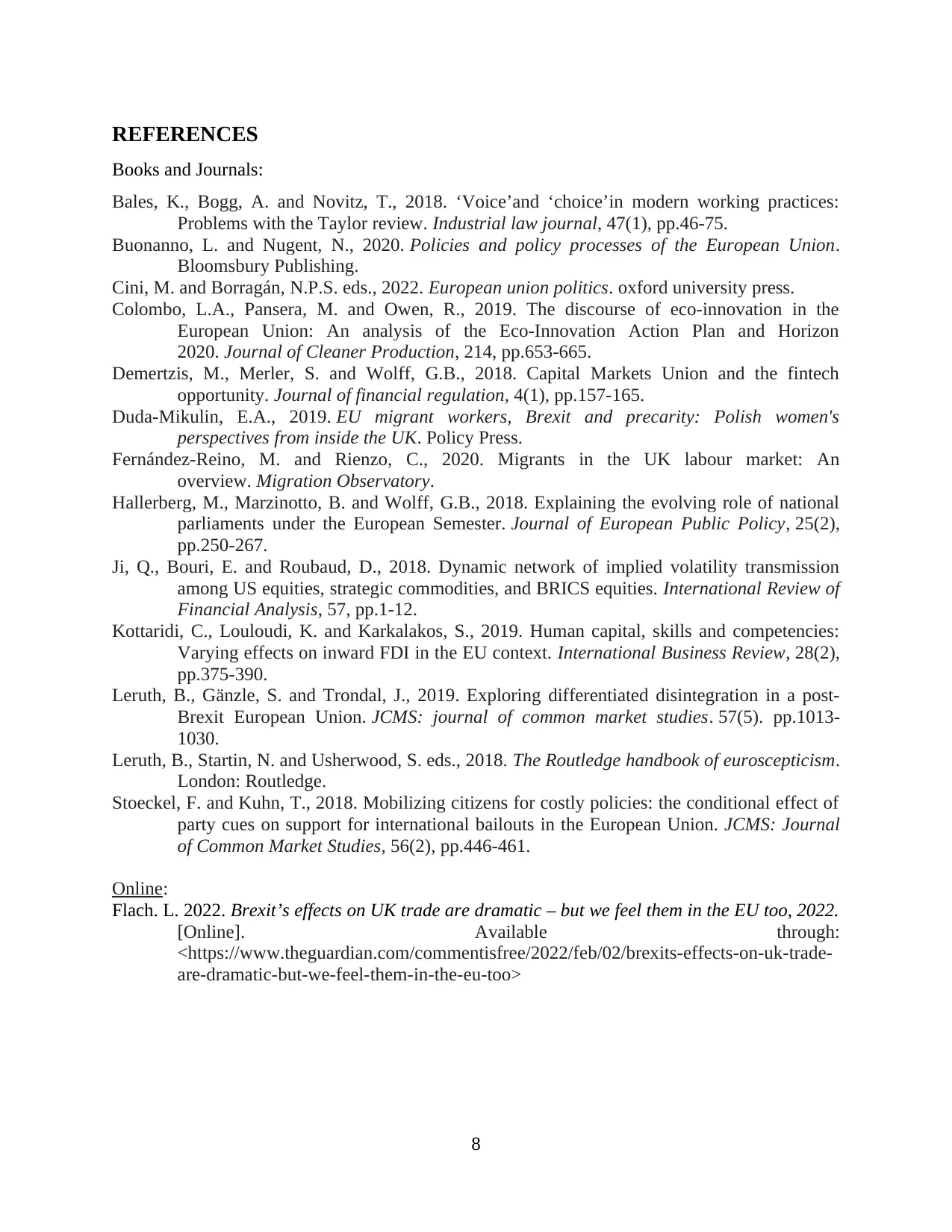
REFERENCES
Books and Journals:
Bales, K., Bogg, A. and Novitz, T., 2018. ‘Voice’and ‘choice’in modern working practices:
Problems with the Taylor review. Industrial law journal, 47(1), pp.46-75.
Buonanno, L. and Nugent, N., 2020. Policies and policy processes of the European Union.
Bloomsbury Publishing.
Cini, M. and Borragán, N.P.S. eds., 2022. European union politics. oxford university press.
Colombo, L.A., Pansera, M. and Owen, R., 2019. The discourse of eco-innovation in the
European Union: An analysis of the Eco-Innovation Action Plan and Horizon
2020. Journal of Cleaner Production, 214, pp.653-665.
Demertzis, M., Merler, S. and Wolff, G.B., 2018. Capital Markets Union and the fintech
opportunity. Journal of financial regulation, 4(1), pp.157-165.
Duda-Mikulin, E.A., 2019. EU migrant workers, Brexit and precarity: Polish women's
perspectives from inside the UK. Policy Press.
Fernández-Reino, M. and Rienzo, C., 2020. Migrants in the UK labour market: An
overview. Migration Observatory.
Hallerberg, M., Marzinotto, B. and Wolff, G.B., 2018. Explaining the evolving role of national
parliaments under the European Semester. Journal of European Public Policy, 25(2),
pp.250-267.
Ji, Q., Bouri, E. and Roubaud, D., 2018. Dynamic network of implied volatility transmission
among US equities, strategic commodities, and BRICS equities. International Review of
Financial Analysis, 57, pp.1-12.
Kottaridi, C., Louloudi, K. and Karkalakos, S., 2019. Human capital, skills and competencies:
Varying effects on inward FDI in the EU context. International Business Review, 28(2),
pp.375-390.
Leruth, B., Gänzle, S. and Trondal, J., 2019. Exploring differentiated disintegration in a post‐
Brexit European Union. JCMS: journal of common market studies. 57(5). pp.1013-
1030.
Leruth, B., Startin, N. and Usherwood, S. eds., 2018. The Routledge handbook of euroscepticism.
London: Routledge.
Stoeckel, F. and Kuhn, T., 2018. Mobilizing citizens for costly policies: the conditional effect of
party cues on support for international bailouts in the European Union. JCMS: Journal
of Common Market Studies, 56(2), pp.446-461.
Online:
Flach. L. 2022. Brexit’s effects on UK trade are dramatic – but we feel them in the EU too, 2022.
[Online]. Available through:
<https://www.theguardian.com/commentisfree/2022/feb/02/brexits-effects-on-uk-trade-
are-dramatic-but-we-feel-them-in-the-eu-too>
8
Books and Journals:
Bales, K., Bogg, A. and Novitz, T., 2018. ‘Voice’and ‘choice’in modern working practices:
Problems with the Taylor review. Industrial law journal, 47(1), pp.46-75.
Buonanno, L. and Nugent, N., 2020. Policies and policy processes of the European Union.
Bloomsbury Publishing.
Cini, M. and Borragán, N.P.S. eds., 2022. European union politics. oxford university press.
Colombo, L.A., Pansera, M. and Owen, R., 2019. The discourse of eco-innovation in the
European Union: An analysis of the Eco-Innovation Action Plan and Horizon
2020. Journal of Cleaner Production, 214, pp.653-665.
Demertzis, M., Merler, S. and Wolff, G.B., 2018. Capital Markets Union and the fintech
opportunity. Journal of financial regulation, 4(1), pp.157-165.
Duda-Mikulin, E.A., 2019. EU migrant workers, Brexit and precarity: Polish women's
perspectives from inside the UK. Policy Press.
Fernández-Reino, M. and Rienzo, C., 2020. Migrants in the UK labour market: An
overview. Migration Observatory.
Hallerberg, M., Marzinotto, B. and Wolff, G.B., 2018. Explaining the evolving role of national
parliaments under the European Semester. Journal of European Public Policy, 25(2),
pp.250-267.
Ji, Q., Bouri, E. and Roubaud, D., 2018. Dynamic network of implied volatility transmission
among US equities, strategic commodities, and BRICS equities. International Review of
Financial Analysis, 57, pp.1-12.
Kottaridi, C., Louloudi, K. and Karkalakos, S., 2019. Human capital, skills and competencies:
Varying effects on inward FDI in the EU context. International Business Review, 28(2),
pp.375-390.
Leruth, B., Gänzle, S. and Trondal, J., 2019. Exploring differentiated disintegration in a post‐
Brexit European Union. JCMS: journal of common market studies. 57(5). pp.1013-
1030.
Leruth, B., Startin, N. and Usherwood, S. eds., 2018. The Routledge handbook of euroscepticism.
London: Routledge.
Stoeckel, F. and Kuhn, T., 2018. Mobilizing citizens for costly policies: the conditional effect of
party cues on support for international bailouts in the European Union. JCMS: Journal
of Common Market Studies, 56(2), pp.446-461.
Online:
Flach. L. 2022. Brexit’s effects on UK trade are dramatic – but we feel them in the EU too, 2022.
[Online]. Available through:
<https://www.theguardian.com/commentisfree/2022/feb/02/brexits-effects-on-uk-trade-
are-dramatic-but-we-feel-them-in-the-eu-too>
8
1 out of 11
Related Documents
Your All-in-One AI-Powered Toolkit for Academic Success.
+13062052269
info@desklib.com
Available 24*7 on WhatsApp / Email
![[object Object]](/_next/static/media/star-bottom.7253800d.svg)
Unlock your academic potential
Copyright © 2020–2026 A2Z Services. All Rights Reserved. Developed and managed by ZUCOL.



